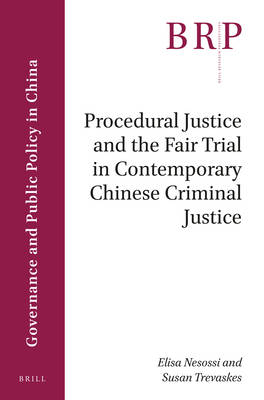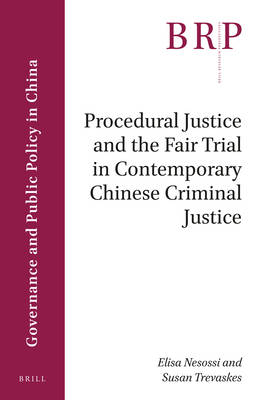
- Afhalen na 1 uur in een winkel met voorraad
- Gratis thuislevering in België vanaf € 30
- Ruim aanbod met 7 miljoen producten
- Afhalen na 1 uur in een winkel met voorraad
- Gratis thuislevering in België vanaf € 30
- Ruim aanbod met 7 miljoen producten
Zoeken
Procedural Justice and the Fair Trial in Contemporary Chinese Criminal Justice
Elisa Nesossi, Susan Trevaskes
€ 128,45
+ 256 punten
Omschrijving
This review examines the literature on procedural justice and the fair trial over the past two decades in the People's Republic of China. Part 1 gives a wide-angle view of the key political events and developments that have shaped the experience of procedural justice and the fair trial in contemporary China. It provides a storyline that explains the political environment in which these concepts have developed over time. Part 2 examines how scholars understand the legal structures of the criminal process in relation to China's political culture. Part 3 presents scholarly views on three enduring problems relating to the fair trial: a presumption of innocence, interrogational torture, and the role of lawyers in the criminal trial process. Procedural justice is a particularly pertinent issue today in China, because Xi Jinping's yifa zhiguo 依法治国 (governing the nation in accordance with the law) governance platform seeks to embed a greater appreciation for procedural justice in criminal justice decision-making, to correct a politico-legal tradition overwhelmingly focused on substantive justice. Overall, the literature reviewed in this article points to the serious limitations in overcoming the politico-legal barriers to justice reforms that remain intact in the system, despite nearly four decades of constant reform.
Specificaties
Betrokkenen
- Auteur(s):
- Uitgeverij:
Inhoud
- Aantal bladzijden:
- 100
- Taal:
- Engels
- Reeks:
Eigenschappen
- Productcode (EAN):
- 9789004386372
- Verschijningsdatum:
- 23/08/2018
- Uitvoering:
- Paperback
- Formaat:
- Trade paperback (VS)
- Afmetingen:
- 150 mm x 231 mm
- Gewicht:
- 22 g

Alleen bij Standaard Boekhandel
+ 256 punten op je klantenkaart van Standaard Boekhandel
Beoordelingen
We publiceren alleen reviews die voldoen aan de voorwaarden voor reviews. Bekijk onze voorwaarden voor reviews.











